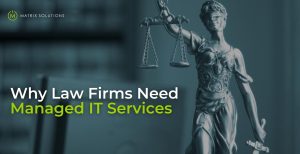Your livelihood depends on your computer systems and data security.
Law firms are especially vulnerable to cyber attacks for various reasons. Hackers see law firms as easy targets because they often have weak security protocols, few firewalls, and outdated software.
They also store a lot of confidential information that can be used to exploit clients or damage reputations. Fortunately, there are ways to shore up your cybersecurity and protect your firm from possible attacks.
This blog post will discuss cybersecurity, its importance, and how you can protect your data against breaches and exploits.

Cybersecurity protects electronic information by reducing risks and vulnerabilities related to unauthorised access, use, disclosure, interception, or data destruction. Data can include confidential business information or personal user data. Vulnerabilities can be weak passwords, software flaws, or insecure communications.
Cybersecurity strategies may involve user training, risk management processes like identity verification and least privilege principles) and technical controls such as firewalls and encryption.)
What are the law firm’s security requirements?
Your law firm’s data is not going to be easy to protect. You will probably make a few mistakes as new cyber threats continue. However, these law firm data protection best practices can help you out.
Creating a Data Security Policy
Many security issues start with human error, not technical problems. Because of this, it is crucial to have a straightforward plan for data security that everyone at the company understands. Your data security policy will take time to learn, so invest effort into educating employees. For example, use two-factor authentication to log into accounts and only use trusted apps.
Staff Training
One of the best ways to avoid falling victim to a cyber attack is to educate your staff on recognising and avoiding common threats, like phishing emails. New hires should receive this training as part of their onboarding process and at least once a year afterwards. By promoting best practices for information security, you can help your entire firm prevent user errors.
Data encryption
Data encryption translates data into a secret code that can only be accessed with a passcode or key. This security method is often used in the tech world because it is highly effective.
Some applications encrypt data for you but check that they have a certificate of authority before using them. If you want to ensure your data is encrypted properly, ask your IT team to handle it. Managed IT services for law firms can help ensure encryption standards and security protocols are up to industry best practices.
Secure Communication
There are many ways to ensure your communications are secure, such as encrypting emails and using apps that offer encryption. If you notice any vulnerabilities in your communication channels, take steps to mitigate them.
Choose your Access Control Options
Every employee needs to be aware of your company’s data security policy, but that doesn’t mean every employee needs access to every piece of information.
Only allow those with a legitimate need to have access control. Employees who handle the least amount of privileged information will have different access levels than others who require more detailed knowledge.
Review your data security regularly
You put your law firm at risk if you don’t regularly review and update your data security policy. Your policy should include a schedule for regular audits so you can identify current threats and take steps to address them. For example, ensure that former employees can no longer access legal files and other important information. It would be best if you also kept an eye on the security software you use, updating it when necessary to ensure it’s effective.
Having a plan for data breaches
A data breach is a daunting thought, but if you have a plan, you can easily comply with your ethical and regulatory obligations. Remember to test your firm’s chosen strategy instead of relying on hypotheticals that could come back to bite you later.
Do law firms need cybersecurity?
It’s no secret that law firms are targets for cyberattacks. After all, they hold a wealth of sensitive information – from client data to confidential legal documents – that can be invaluable to criminals.
But many people don’t realise that cyber security is just as important for small and medium-sized law firms as it is for large ones.
Smaller firms may be at even greater risk, as they often lack the resources and expertise to defend themselves effectively.
Why is cybersecurity important in the legal sector?

Cybercriminals are going after law firms more and more because they know that these businesses have a lot of money. The following Law firm cyber attack statistics are from the Solicitors Regulation Authority (SRA) about their visits to 40 practices where they reviewed the company’s theme on cyber security
Three-quarters of the law firms SRA visited said a cyberattack had hit them. Twenty-three had money stolen from clients totalling over four million pounds. Half let staff use data storage devices freely, and a quarter hadn’t encrypted their laptops.
As technology becomes more advanced, so do the methods of cybercrime. A 2016 BT-KPMG report discussed how today’s criminals work for large organisations with departments and resources dedicated to developing new ways to commit crimes. Since then, things have only gotten worse. Cybercriminals are now more organised and sophisticated than ever before.
There are a few key reasons law firms need to prioritise cyber security:
Protect confidential data
Law firms deal with many confidential and sensitive information, such as client communication and financial details. A breach in security could lead to this information being stolen or leaked, causing significant damage to the firm and its clients.
Protect sensitive clients’ data
In protecting the law firm’s confidential information, they are also responsible for protecting their client’s sensitive data. A data breach could lead to a loss of trust and reputation damage for the firm and its clients.
Damage to the Firm’s Reputation
A cyberattack can result in financial losses, such as the cost of fixing the breach and compensating clients. It can also damage the firm’s reputation and lead to loss of business.
Lawyers’ ethical obligations
Lawyers have ethical obligations to protect their client’s information, as outlined in the SRA Code of Conduct. Failing to prioritise cyber security could result in disciplinary action and potential loss of license to practice law.
The GDPR and other regulatory bodies have specific requirements for protecting personal data, and non-compliance can result in significant fines.
Loss of business continuity
Cyber security is not just about protecting confidential information; it’s also important for protecting the law firm’s day-to-day operations. A cyberattack can lead to system outages and disruptions, resulting in lost productivity and potentially lost income.
Loss of Client trust and confidence
If a law firm experiences a data breach, it can lose the trust and confidence of current and potential clients. Clients expect their information to be properly protected and secure in today’s digital age, and rightly so.
A strong cyber security strategy can help law firms avoid potentially costly consequences and build trust and credibility with clients. The legal industry should prioritise cybersecurity seriously in their business operations.
Most Common Cybersecurity Threats for Law Firms
Look at some of the most frequently reported cybersecurity threats law firms have endured.
Phishing Scams
Phishing scams involve criminals sending fraudulent emails or online messages, posing as legitimate sources to trick the recipient into providing confidential information or funds. These schemes can be sophisticated and often use personal information obtained from data breaches to appear authentic.
Hacked Email Accounts
Another common cybersecurity threat for law firms is hacked email accounts, which can lead to confidential information being accessed or stolen. This can also result in phishing scams, as hackers use the compromised account to send fraudulent emails.

Ransomware
Ransomware is a type of cyberattack where the attacker encrypts or locks access to a computer system, demanding payment in exchange for restored access. These attacks can lead to significant disruptions in business operations and the potential loss of important data if not properly protected.
Data Breach
A data breach occurs when an attacker gains unauthorised access to sensitive information, such as client communication or financial details. This can lead to significant consequences for the law firm and its clients, including reputation damage and loss of trust.
Malpractice Allegations
Failing to prioritise cyber security for law firms and protect confidential information can also lead to legal consequences, such as malpractice allegations. Taking steps to protect against these threats, such as training employees to spot and avoid phishing scams, regularly updating software and passwords, and investing in a robust cybersecurity strategy, can help law firms mitigate the risks and protect their business.
Increased Standards by Clients
In addition to legal and ethical obligations, law firms may face increased scrutiny and client standards of data protection law firms should provide. Many corporations now have their security protocols in place and may require external vendors, including law firms, to meet certain cybersecurity requirements before doing business with them.
Law Firm Cybersecurity Best Practices
We already have discussed that cybersecurity should be an integral part of law firms, but how can you ensure you have the best cybersecurity for law firms?
Here are some cybersecurity best practices you should adopt for your law firm.
Implement an effective data security policy
Develop and regularly update a formal data security policy that outlines processes and protocols for protecting confidential information, such as employee training on recognising phishing scams and properly handling sensitive client information.
Train staff on cybersecurity risks and best practices
Regularly train and educate employees on recognising and avoiding cybersecurity threats, such as phishing scams, and properly handling confidential information.
Use strong passwords
Ensure that all accounts, including email and computer access, have strong and unique passwords, and regularly update them to reduce the risk of hacking. Multi-factor authentication, such as a password and a code sent to a separate device, can provide an additional layer of protection for sensitive accounts and information.
Encrypt Data
Encrypting sensitive data, such as client communication and financial information, can help protect against potential breaches and unauthorised access.
Secure communications
Use secure communication methods, like encrypted email, to share sensitive information with clients and prevent unauthorised access.
Consider access control
Only allow people who need access to sensitive information or accounts to help reduce the risk of unauthorised individuals gaining access.
Implement strong mobile security
If employees access firm information or communicate with clients on mobile devices, implement measures to secure and protect this data, such as requiring passwords and regularly updating.
Regularly back up your data
Regularly back up important data, such as client information and communication, to protect against potential loss in the event of a cyberattack or other issues. Stay informed about current and emerging cybersecurity threats and regularly update software and security.
Update your software and systems regularly
Stay current on the latest software and system updates, as these often include important security patches. Consider working with a reputable, experienced IT provider to ensure your systems and data are secure. They can assist with implementing and regularly updating your cybersecurity measures for your law firm’s security requirements.
Vet vendors
Carefully vet and research any external vendors or business partners, as their cybersecurity measures may impact the security of your firm’s information.
Develop an Incident Response Plan
Develop a plan for responding to potential cybersecurity incidents, including who to contact and steps to help minimise damage and address the issue quickly.
Monitor systems for unusual activity and threats
Regularly monitor your systems for any unusual or suspicious activity and take measures to address and mitigate potential threats quickly. This can include using antivirus software, firewalls, and regularly scanning for vulnerabilities.
Educate clients on the importance of data security
Inform clients about the importance of data security and measures they can take to protect their information, such as using strong passwords and being wary of phishing scams. This can help reduce the potential for a data breach involving client information.
Hire a cybersecurity expert to conduct a security assessment
Consider hiring a cybersecurity expert to assess and evaluate the current state of your firm’s data security measures and provide recommendations for improvement. Regularly re-assessing and updating your measures can help keep up with evolving threats and ensure ongoing protection.
What to do if your law firm is hacked?
If your law firm experiences a cybersecurity incident or breach, report it to the proper authorities and legal entities as soon as possible. Follow your incident response plan to mitigate any damage and address the issue. This may include notifying clients whose information could have been affected and offering protection resources—their data.
Working with a cybersecurity expert can also help assess the situation and guide the next steps in strengthening cybersecurity policy for law firms. Additionally, regularly review and update your firm’s cybersecurity measures to prevent future cyber threats to law firms.
Has there been any data breaches in 2022?
1. The robbery of Crypto.com
On January 17th, nearly 500 people had their cryptocurrency wallets stolen in an attack that resulted in the hackers taking $33 million worth of Bitcoin, Ethereum, and other cryptocurrencies. The hackers could get around two-factor authentication and access users’ wallets.
2. Microsoft Data Breach
On March 20th, 2022, a group of hackers known as Lapsus$ infiltrated Microsoft’s systems. They took and posted a screenshot on Telegram to show the world they had successfully hacked Cortana, Bing, and several other well-known products under Microsoft’s control. The attackers retrieved some data from within Microsoft before its security team stopped them on March 22nd. Only one account was compromised when Lapsus$ had access to Microsoft’s systems.
3. News Corp Server Breach
In February 2022, News Corp confessed to server breaches extending back to February 2020. Although News Corp claimed that no customer data was lifted during the infringement, and its day-to-day functions weren’t impeded, further investigation found that the email accounts of its journalists had been hacked. The culprits have not yet been named, but News Corp has stated that espionage is likely the motivation behind the attack.
4. Red Cross Data Breach
In January 2022, hackers breached servers containing the personal information of more than 500,000 people receiving services from the Red Cross and Red Crescent Movement. The data relates to the organisation’s Restoring Family Links service, which reconnects people separated by war, migration, or violence. The Red Cross took servers offline to stop this suspected attack but has not been able to identify a culprit definitively.
5. Ronin Crypto Theft
The Ronin’s Axie Infinity game, which allows players to accrue digital currency and non-fungible tokens (NFTs), was targeted between November 2021 and March 2022. As the game’s player base increased, security protocols were dialled back so that the servers could handle a larger load, letting in more legitimate players and criminals who stole $625 million in cryptocurrency.
6. FlexBooker Data Breach
Towards the end of 2021 and early 2022, FlexBooker – an appointment management business – was struck by a large attack that affected three million users. Data, including ID information, driver’s licenses, and passwords, were stolen and sold on well-known hacking message boards. A group of hackers known as Uawrongteam managed to get hold of FlexBooker’s data by exploiting its AWS configuration. After the hackers gained access to the servers, they installed malware that gave them complete control over the system. Since many people stopped using the platform after this event occurred, it took a toll on the company’s finances.
7. GiveSendGo Political Data Breach
In February 2022, the Christian fundraising site GiveSendGo was breached by a hacker who redirected the site to a page condemning the Freedom Convoy protests – a Distributed Denial of Service (DDoS) case attack. The hack was likely motivated by political reasons, as the hacker has claimed credit for hacking far-right social networks in the past. The hacker accessed the personal information of 90,000 donors who contributed to the Freedom Convoy via the GiveSendGo website and published it.
8. Cash App Data Breach
Cash App admitted in April 2022 that a former employee had hacked its servers. The hacker appeared to have a personal vendetta against the company. The hack involved customer names, stock trading information, account numbers, and portfolio values, among other sensitive financial data. Cash App notified more than eight million affected customers of the incident. Luckily, no account credentials were stolen in the attack, and only limited identifiable information was taken.
9. Marquard & Bahls Supply Chain Breach
A supply chain attack is when a company’s IT infrastructure is destabilised, which causes widespread issues. This was the case for a German energy giant in February 2022, where over 200 gas stations had to close across Germany.
10. PressReader Data Breach
PressReader, the world’s largest online distributor of newspapers and magazines, was attacked in March 2022. This caused a temporary halt to the publication of numerous top news titles, from big names like the New York Times to local papers and outlets. PressReader has not yet announced whether ransomware was involved in the attack. However, this incident closely followed the company’s announcement that it would give users in Ukraine free access to news articles. While PressReader could quickly restore its full publishing capability, the three-day attack still stopped people from accessing more than 7,000 news sources during that time.
There was also a phishing email scam Google and Facebook fell victim to. You can read more about this here.
What recent data breaches can teach us about cybersecurity?
1. Both small and large firms are at risk
You might think all the data breaches have financial motives and only larger firms can be threatened. However, the FlexBooker and GiveSendGo incidents show that even small companies can be targeted. In the Cash App breach, we see that a former employee was responsible for hacking the company’s servers. This shows how personal grudges can result in cyberattacks, not just financial gain. We can also decipher that nation-state or political agendas can be equally dangerous for data breaches.
2. Be proactive about cybersecurity rather than waiting for another breach to happen
The PressReader attack reminds companies to continuously update their cybersecurity measures rather than waiting until an attack occurs. It’s important to stay informed about potential threats and have a plan in emergencies.
3. Cybersecurity awareness should not be a one-time event but an ongoing part of your culture
The Marquard & Bahls incident demonstrates how supply chain attacks can ripple effects on multiple businesses. This highlights the importance of having individual cybersecurity measures in place and considering the security of your business partners and vendors. Considering these issues as part of an ongoing, integrated approach rather than a one-time event is crucial.
4. Regularly review and update your policies & controls
In the case of the PressReader attack, their decision to offer free access in Ukraine may have made them a target for cybercriminals. Reviewing and updating policies and controls can help anticipate and prevent potential attacks. This includes periodically training employees on cybersecurity best practices and staying up-to-date on the latest threats and trends in the industry.
5. Make sure your staff and clients are updated about the cybersecurity best practices
All these data breaches serve as reminders to not only train employees on cybersecurity best practices but also make sure clients are informed. This includes alerting them to potential phishing scams or other threats and regularly updating passwords and personal information safeguards.
6. Take data storage & encryption seriously
The PressReader attack serves as a reminder of how even temporary disruptions can have major consequences for a company and its customers. It also highlights the importance of not underestimating the potential impact of a data breach, both in terms of financial losses and damage to reputation. Regularly reviewing and updating policies, training staff, and taking data storage and encryption seriously can help minimise the chances and impact of a breach.
7. Keep a record of and report any cybersecurity incidents
The Google and Facebook phishing scam shows that even major tech companies can fall victim to attacks. It’s important to record any incidents, report them to authorities, and take steps to mitigate future threats. This helps protect your business and contributes to larger cybersecurity awareness and prevention efforts.
8. Incorporate a cyber security budget into the firm’s financial planning
Cybersecurity measures can sometimes be seen as an added expense rather than a necessary investment. However, the potential economic consequences of a data breach can far outweigh the cost of preventative measures. Incorporating a cyber security budget into financial planning can help ensure that necessary steps are taken to protect sensitive information. Data and prevent attacks.
How to prioritise cyber security in your law firm?
Now that we have learned about cybersecurity, threats, and best practices, how can you, as a law firm can, prioritise your security?
To put it all together, here is the list of things you can do to ensure strict cybersecurity practices are in place.
- Assess your current cyber security measures
- Understand your firm’s cyber security risks
- Create a cyber security policy and protocol
- Train employees on cyber security best practices
- Use secure passwords and encryption software
- Back up your data regularly
- Test your systems regularly
- Create a disaster recovery plan in case of a system breach
- Work with MSSPs
What is Managed Security Service Provider (MSSP)?
A managed security service provider (MSSP) is a company that provides organisations with a comprehensive set of security services. These services include firewall and intrusion detection to incident response and data protection. Many MSSPs also offer 24/7 monitoring and support, which can be valuable for businesses that lack the internal resources to manage their security posture properly. By outsourcing managed security services to an MSSP, companies can free up their resources to focus on other priorities.
In addition, MSSPs can provide economies of scale and access to best-in-class technology and expertise. For these reasons, MSSPs have become an increasingly popular option for businesses of all sizes.
How can Matrix Solutions help your law firm stay safe online?
At Matrix Solutions, we understand that law firms increasingly rely on technology to conduct their business. However, this increased dependence also makes them more vulnerable to cyberattacks. As a result, it is essential for law firms to have a robust security infrastructure in place to protect their data.
Fortunately, Matrix Solutions can help. As a Managed IT Services Provider, we offer Managed Security Services, providing your firm with the resources and expertise needed to secure your network. We offer a comprehensive suite of security services, including intrusion detection and prevention, firewall management, and email and website security. In addition, our team of certified security professionals can provide you with around-the-clock monitoring and support.
With Matrix Solutions as your MSSP, you can rest assured that your firm’s data is safe from cyber threats with the latest technology against Law firm data breaches even in 2025.
Contact Matrix Solutions Today!
Conclusion
Strong cyber security measures can help protect the firm and give them a competitive edge in acquiring new clients. The legal industry should prioritise and invest in cybersecurity to protect sensitive information and avoid potentially costly consequences. Taking proactive steps to prevent threats can also help build trust and credibility with clients. Law firms must stay current on the latest cybersecurity measures and adjust their strategy.



